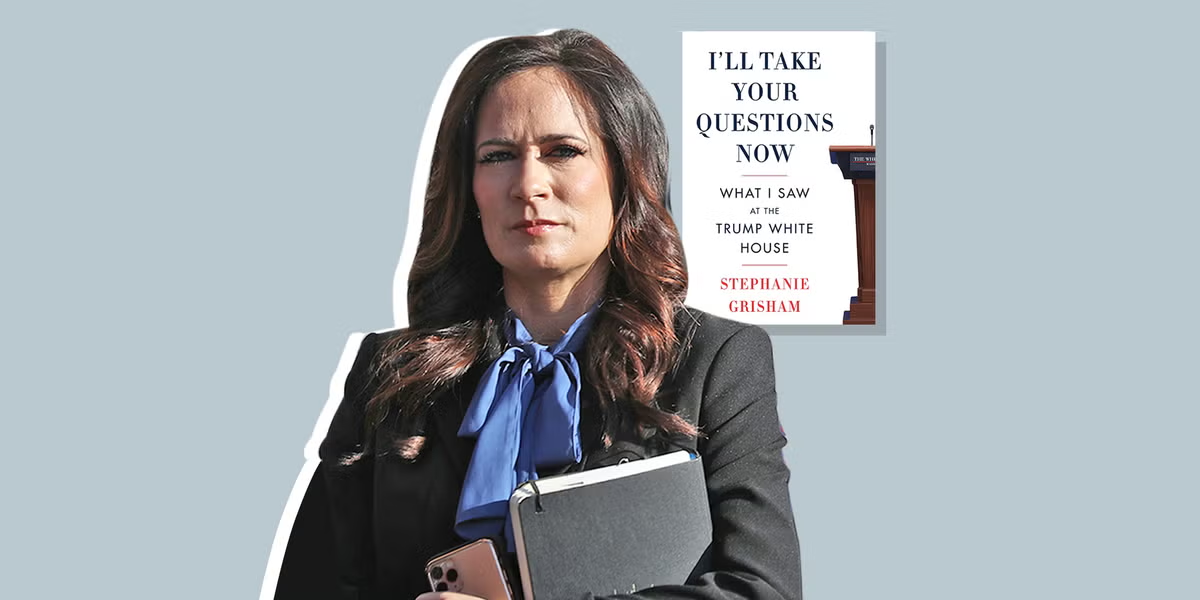Stephanie Grisham’s memoir unfolds like a fever dream—equal parts chaotic and candid—offering a vivid, unvarnished chronicle of life inside the Trump White House. From her dual roles as press secretary and later chief of staff to Melania Trump, she was positioned at the heart of a presidency defined by its spectacle and turmoil. Her account pulls no punches, and the tone is unmistakably personal, brimming with a mixture of regret, reflection, and rebellion.
Early in the book, Grisham paints the First Lady as enigmatic and distant, rarely venturing beyond her private quarters. An image emerges almost gamelike: Melania, preferring remote communication, earning herself the secret nickname “Rapunzel” amid staff jokes. Grisham also recalls tension between Melania and Ivanka Trump, whose frequent camera-ready moments earned her labels like “the Princess.” These details may seem mundane, but they reveal an internal world ruled by optics, ego, and fragile protocols.
Jared Kushner, too, comes under Grisham’s scrutiny. She describes him as meddlesome and overreaching—writing speeches, briefing foreign leaders, and wielding influence without proper clearance—a “Rasputin in a slim-fitting suit.” His proximity to power, she argues, reflected broader dysfunction: unqualified, unaccountable, and unchecked.
Grisham also digresses into moments of absurdity and tension that underscore the presidency’s volatility. One standout memory comes from the 2019 G20 Summit in Osaka. She recounts Trump adopting a tough posture in front of Putin, only to revert to intimacy once the press departed—a chilling waiver of public optics for private submission. And then there is the infamous hand-slap moment—something the media exploded over. Grisham insists the gesture was a protocol-based dismissal, deliberately misunderstood for drama.
Through it all, her prose drips with incredulity, painting Trump’s world as a “clown car on fire” hurtling toward disaster. Her disillusionment mounts with each high-stakes moment: Kellyanne Conway’s infamous jacket, Stormy Daniels’s lawsuit, and the secretive medical visit at Walter Reed, all of which expose a White House groaning under the weight of its contradictions.
Grisham admits her own complicity. She reflects on staying through scandal after scandal—Charlottesville, impeachment, the Daniels case—wondering what finally made her quit. The answer eventually came at the Capitol on January 6. When she urged Melania to condemn the violence, Melania’s single-word refusal—“No”—finished Grisham’s tenure. By resigning that night, she threw her lot behind conscience rather than loyalty.
Her reflections don’t shy away from self-critique. She describes her tenure as a “classic abuse relationship,” alternately craving approval and recoiling from the chaos. She confesses to strategic meddling—like shifting seating cards to outshine Ivanka in photographs—yet frames it as the small power plays available to a woman caught between two Trumps. Those acts feel petty in the broader landscape of institutional decay, but they humanize someone often dismissed as spin-doctor or sycophant.
Grisham’s portrayal of Trump is not a caricature—it is complicated. On Air Force One, she recounts him mocking journalists as "animals" then erupting at anyone who criticized him. She does not paint him as all-powerful genius, nor as an outright monster—just someone damaged, childish, and dangerously volatile.
Her voice is one of weary insight rather than vindictive gossip. She acknowledges her own ambition and moral missteps while pointing to an organization that rewarded chaos. She reflects on why resignations from other administrations meant little here, and why the presidency presided over a culture that prized loyalty above competence.
What makes her memoir stand out is the blend of personal reckoning and White House drama. The book doesn’t merely add to the archive of Trump exposés—it refracts it through one woman’s awakening. She speaks of her complex bond with Melania—admiration sparking competing loyalties—and her fraught identity as part of a team she ultimately could no longer defend.
At times the tone feels confessional rather than forensic, but beneath that is a portrait of power and its consequences. The memoir ends not with triumph, but with questions: What did she learn? What would she do differently? Who can resist when surrounded by insatiable ambition and fear?
In the end, I’ll Take Your Questions Now is both a confessional and a cautionary tale: a look inside a presidency that prized image over integrity, a chronicle of one woman’s fracture from intimacy with power, and a reminder that some truths only matter when the lights go down.








